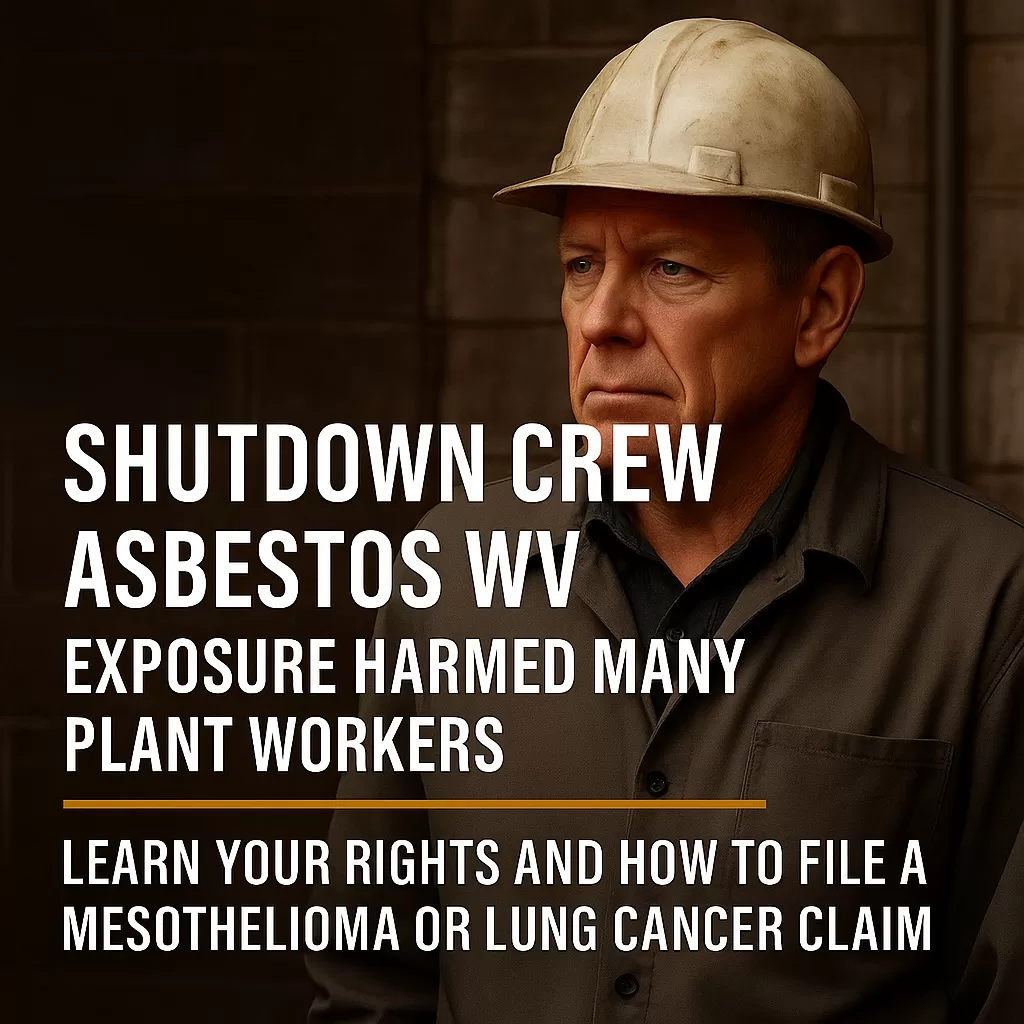Shutdown crew asbestos WV exposure was one of the deadliest types of industrial contact with asbestos — and few workers ever knew it. These specialized crews, often brought in during plant turnarounds and maintenance outages, were sent into the most dangerous environments: boiler rooms, reactor units, furnaces, and high-heat systems full of deteriorating insulation.
Whether they worked in Weirton, South Charleston, Follansbee, or Nitro, these workers were exposed to massive levels of airborne asbestos during short-term shutdown contracts — often lasting just weeks. Decades later, many are being diagnosed with mesothelioma, lung cancer, or asbestosis.
If you or a loved one was part of a shutdown crew in West Virginia and now faces an asbestos-related illness, legal help is available.
Why Shutdown Crews Faced Extreme Asbestos Exposure
Shutdown crews were responsible for tearing out, rebuilding, and replacing high-heat systems in steel mills, chemical plants, refineries, and powerhouses. These jobs often included:
- Stripping old asbestos pipe insulation
- Demolishing refractory brick in boilers and furnaces
- Welding or torching pipe systems caked with asbestos lagging
- Cutting, mixing, and applying new asbestos cement
- Working in confined, poorly ventilated spaces
The exposure levels during shutdowns were astronomical — even higher than what regular maintenance workers faced. Yet these jobs were often contracted out with little to no training or protection.
West Virginia Facilities Where Shutdown Crews Worked
Shutdown crews were commonly brought into plants like:
- Weirton Steel
- Koppers/Follansbee Coke
- Union Carbide Institute and South Charleston
- DuPont Belle Works
- AEP’s Kammer and Mountaineer Power Stations
- Owens-Illinois Glass Plants
- Ashland Refinery / Marathon (Huntington area)
Because many of these jobs were short-term, workers often moved site to site — unaware they were collecting exposure with each outage.
👉 Search Asbestos Job Sites in West Virginia
Take-Home Asbestos Exposure from Shutdown Crews
Shutdown crew members often returned home coated in asbestos dust. Spouses who washed uniforms, or children who greeted their fathers after 12-hour shifts, may now be facing secondary exposure illnesses of their own — particularly peritoneal or pleural mesothelioma.
West Virginia law recognizes take-home asbestos claims, and surviving family members may also be eligible for wrongful death compensation.
Legal Options for WV Shutdown Crew Workers
If you worked on plant shutdowns or maintenance outages and were later diagnosed with mesothelioma or asbestos-related lung disease, you may qualify for:
- Asbestos trust fund compensation
- Lawsuits against insulation and equipment manufacturers
- Settlements for take-home or wrongful death claims
- Legal help — even if the employer is long gone
Time limits apply. In WV, you typically have 2 years from diagnosis or death to file a claim.
Talk to a Lawyer Who Knows Shutdown Crew Asbestos in WV Cases
Attorney Lee W. Davis has handled asbestos cases tied to shutdown work at Weirton Steel, Union Carbide, and multiple WV powerhouses. With over two decades of experience and a background in plant-specific exposure, he can help workers and families secure compensation — even decades after exposure.
📞 Call 412-781-0525 or fill out the secure form below to get started.
Check If Your Family Was Exposed
Get your free guide instantly + a confidential case review.
🔒 100% Confidential. No obligations.
FAQ – Shutdown Crew Asbestos WV
What is a shutdown crew and how were they exposed to asbestos?
Shutdown crews were temporary workers brought in for plant maintenance. They tore out old insulation, boilers, and furnace linings — many of which contained asbestos.
Do short-term asbestos jobs still qualify for legal claims?
Yes. Even a few weeks of high-intensity exposure during a plant shutdown may be enough to cause mesothelioma. These claims are legally recognized.
Can family members file if a shutdown worker passed away from asbestos-related illness?
Yes. West Virginia allows wrongful death claims and take-home exposure lawsuits for surviving spouses and children.

